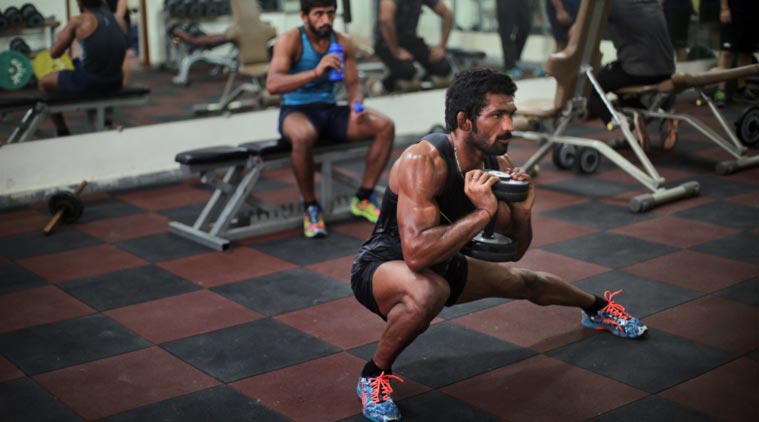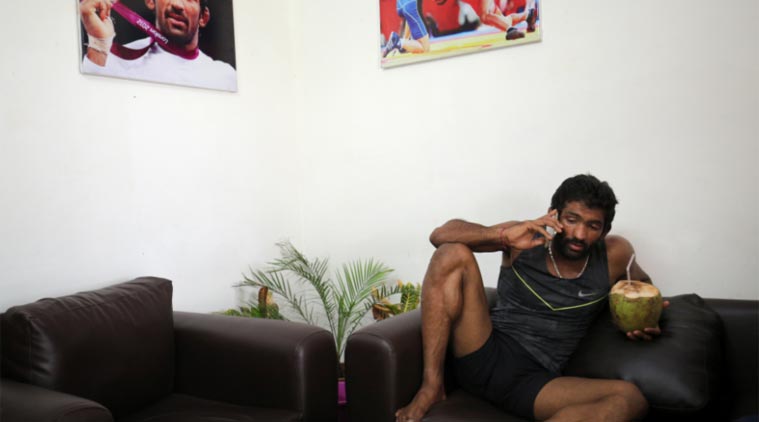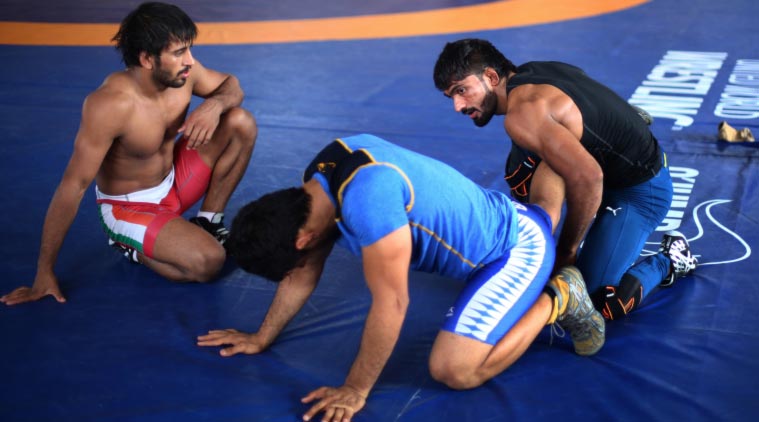Yogeshwar Dutt: From a shy, self-effacing village boy to patriot, philosopher and ‘pehelwan’
Not too long ago, Yogeshwar Dutt, for the world, was a shy, self-effacing village boy, who silently climbed the Olympic podium at London. Then came Twitter, and an image-change.
 Yogeshwar Dutt during a workout session in the gym. (Source: Express Photo by Oinam Anand)
Yogeshwar Dutt during a workout session in the gym. (Source: Express Photo by Oinam Anand)
Chapter 1: a tweet from February 2016. (Embedded below)
“Rashtravaad.” Yogeshwar Dutt sinks in the sofa, legs folded, sipping coconut water. He contemplates for a moment, then repeats again. “Rashtravaad…wohi toh ek dharm hai.” (Nationalism is a religion). “We have no other identity, do we?” he says.
Though he has been tweeting for a while, and had rebuked the actor Aamir Khan last year for saying India was getting intolerant, it was this February that Dutt really exploded on the social media scene. Unlike the cricketers and a majority of other sportsmen for that matter, it was clear that Dutt wasn’t going to be content just wrestling bodies but was interested in wrestling minds by joining debates and taking sides on issues that unravel in this diverse country. You might agree or disagree with his views but Dutt isn’t going to be a mute witness. Tweets and retweets flooded his timeline after the student leader Kanhaiya’s speech at the JNU. An emotional poem he posted on Facebook, and subsequently tweeted, went viral.
“… (Those who are singing praises of Afzal Guru have the blood of Mahmud Ghazni in them. They consider themselves as enemies of the country in which they are born. What sort of freedom of speech is this that permits one to abuse Mother India? What sort of freedom of expression allows one to violate the honour of my country? If Afzal is martyr then who is Hanumanthappa?” the poem raises the death of Lance Naik Hanumanthappa, who was buried under 35 feet of snow after an avalanche hit an army camp in Siachen Glacier.
किन लोगों के लिए सेना के जवान जान की बाज़ी लगा रहे हैं और किन लोगों के गर्व के लिए खिलाड़ी दिन रात पसीना बहा रहे हैं pic.twitter.com/hMqKNdjxkE
— Yogeshwar Dutt (@DuttYogi) 13 February 2016

“Dost ne likhi, maine chipka di.” It was a poem crafted by his friend, and Dutt posted it on social media as he felt the same sentiments. In that poem, Kanhaiya is called napunsak (impotent), the protesters are compared to Turkish invader Mahmud Ghazni and the names of Chandrashekhar Azad and Bhagat Singh are also invoked. The subsequent flood of tweets by him with a similar theme earned him praise and brickbat, with some criticising him for falling prey to ‘right-wing propaganda’ rather than focusing on his sport. But Dutt insists his political ideology isn’t painted in any colour. “JNU issue wasn’t a political thing for me. He (Kanhaiya) spoke against the country. If it’s about country’s benefit, then we should talk about it. I don’t think if BJP feels bad or someone else will feel bad. I say what I feel is right,” he says. “Our army sacrifices their life for the country. We just play for the country. They die for the country. Mahaan hai woh…”
This unflinching baring of his soul changed Dutt’s public image of being this shy village boy who cared about nothing but wrestling. “Chup toh mein abhi bhi rehta hoon, magar mere jo vichaar hai woh…(I am silent even now but my thoughts…)” he argues with a smile. “Whatever I feel strongly about – the rights and wrongs – I will talk openly about it. If I am not able to do that then God should have made me mute.”
Social media unmuted him. Though Yogeshwar is barely reachable on his phone, he likes to be surrounded by people. He shares his apartment with four or five close wrestler friends while hordes of well-wishers – young and old – queue up to meet ‘pehlwanji’ every day. A year or so ago, you wouldn’t have imagined the 34-year-old to speak up on such an issue. He was, and continues to be, very self-effacing. But in the last few months, even as he copped abuse from fans of Salman Khan, he has spoken contemptuously when the actor was declared an ambassador for Olympics. Last month, he retweeted the singer Sona Mahapatra: “Women thrashed, people run over, wild life massacred & yet #hero of the nation. ‘Unfair’. India full of such supporters.”

He has also sacrificed his friendship with fellow wrestler Sushil Kumar by speaking out in support of Narsingh Yadav. It’s Dutt like we have never known him. For his friends, though, it is the Yogeshwar they have always known.
Chapter 2
– May 2016, Yogeshwar’s tweet about girls’ education to the Haryana chief minister
His friends have seen the evolution from a shy boy to this outspoken Twitter star but they know that it isn’t a transformation but just a flowering of personality. Raised in a household of teachers, in Bhainswal Kalan, a tiny village in Sonepat, Dutt’s dinner conversations with parents and friends were stimulating. Hours were spent reading biographies of Subhash Chandra Bose, Chandrashekhar Azad, Bhagat Singh and Jhansi ki Rani.
The interest in literature slowly extended to poetry. He is a big fan of poems written by former Prime Minister Atal Bihari Vajpayee and the performance poet and politician Kumar Vishwas. But those closest to his heart are by Hari Om Pawar, especially his heart-wrenching poem on Kashmir’s freedom. “Kya kavita hai woh! Hari Om Pawarji’s poetries give me goosebumps,” he says.
His parents wanted him to follow their career-path but he was drawn to wrestling from a very young age. He would daydream about being like Balraj Pehelwan. Bestowed with the title of Hind Kesari, Balraj was very tall and extremely strong. Mythical stories on his exploits in the mud-pits further added to the legend of ‘Ballu Pehelwan’. He died doing what he loved the most – during a fiercely-contested dangal. And that inspired Dutt even more. He did not know what the Olympics were back then.
Wrestling was also continually shaping his spiritual side. True to the akhara tradition, he carries his Bajrang Bali idol everywhere. He offers prayers to Hanuman before stepping on the mat. The deeply religious wrestler is also a firm believer in what is considered to be one of wrestling’s foremost tenets – brahmacharya. “Of course I am a brahmachari,” he smiles. “I will get married once my career is over.”
A vegetarian himself, the only time Dutt scoffs at his friends is when they eat meat. Former India women’s basketball team captain Prashanti Singh who knows him from 2002 when both were recruited by MTNL Delhi under sports quota, talks about Dutt’s only reproach to her. “He always tells me, ‘pehelwanji, ek jeev doosre jeev ko kaise kha sakta hai? Chod do yeh… (how can one living being eat another living being? Stop eating non-veg).”
These ideologies moulded him into an opinionated person with high set of principles and a very strong sense of right. But he wasn’t articulate enough, so often kept his views to himself. Prashanti remembers him as a shy, village boy.
Once, he confessed to Prashanti that he feared he would accidentally poke himself while eating with a fork. Prashanti laughed it off. But Dutt wasn’t kidding. He has even run away from official dinners for the fear of fork, and has contended himself with glasses of milk instead of the lavish spread at the five-star hotel.
“Like most wrestlers, he too was shy,” Prashanti says. “But we forged a bond immediately since we came from very similar backgrounds. However, he was so innocent and was still new to the city culture that I felt very protective of him. Almost like his bodyguard,” she laughs.

It was Prashanti who introduced him to Twitter during the Incheon Asian Games in 2014. Yogeshwar always wanted to be heard. And the little birdie has given him the wings.
He defines himself as ‘a proud Hindustani’ on his Twitter profile. The 155 people he ‘follows’ include RSS, Indian Space Research Organisation and CNN International. “Twitter keeps you updated with current affairs. Most of my reading these days happens on my phone,” he says. “There are a lot of wrestlers on Facebook. But it’ll be good if they come on Twitter because there is more news available on it. More viewpoints. Twitter broadens your horizon. It’ll keep you informed on what’s happening in India and around the world. It’s important to know what sacrifices people make to achieve what they want to,” he says.
Chapter 3
I’ve never ever seen anyone doing neck weight exercises. Insanity!!#Dedication #Obsession #RoadToRio @DuttYogi pic.twitter.com/iENIJiz5qC
— Viren Rasquinha (@virenrasquinha) 14 March 2016
//platform.twitter.com/widgets.js
– March 2016, Viren Rasquinha,
former India hockey captain, tweets a video where Yogeshwar has heavy weights
dangling from his neck.
Twitter has helped him release his inner angst and share his thoughts but wrestling was and remains his life. His Twitter feed is also well punctuated by a stream of jaw-dropping exercise videos he posts. Some have even left former Olympians like Rasquinha feeling awed.
It’s been quite a journey, filled with trials and tribulations. He underwent five major surgeries, three of them in 2015 alone but he has soldiered on. His father died days before the 2006 Asian Games but his mother insisted he should go and this May when he was in Georgia, she had three heart blockages but he was kept in the dark as the family didn’t want to upset his Olympic preparations. Dutt says his family has shielded him from all the negativity, even if it meant hiding the news of someone’s death. In 2009, he was in South Africa when his grandmother breathed her last. But Dutt was informed about it only after he returned.
His father’s death was toughest as he had to leave for Doha in just two days. “It was one of the toughest decisions I had to make. I left for Doha just two days after my father died. My mother insisted I should go,” he says.
Dutt beat Tajikistan’s Zalimkhan Yusupov in the 65kg freestyle final to win the gold at those Games, and dedicated his medal to his late father. It was also India’s first Asian Games wrestling gold in 28 years. “It hurts a lot. I haven’t been there for my family when they need me. It troubles you and it’s not just about me. This happens with every sportsperson because everyone faces such difficulties,” he says. “But lage hue hai hum gold ki talaash mein,” the smile returns on his face.

Dutt looks for inspiration in sacrifices. His battle-worn face and cauliflower ears tell a story of decades spent grappling with opponents from around the world.
It’s given him fame and money. In 2004, just before the Athens Olympics, he purchased a second-hand Maruti 800 and inscribed ‘wrestling is life’ on the rear window. “Then one day, I realised it’s not everybody’s life. It is my life. So I changed it to ‘wrestling is my life’,” he says.
Today, as he goes for his fourth Olympics, he has four top end SUVs and sedans with ‘wrestling is my life’ written on them. He likes cars. They also remind him of all the sacrifices he and his family have made to make this possible. “Family’s contribution is most vital. I spend hours training but none of it would matter if they didn’t stand by me,” he says.
It’s also been a difficult period for him personally. The body is slowly giving up, which is why he wants to make his last chance count.
After Rio, Dutt plans to focus on establishing his academy and working with the Haryana police, where he is a DSP. Both the roles are ‘service to the nation’, he says. What about politics, you ask him. He refuses initially but pauses for a bit before adding: “Kya pata, agar mood ban jaye. (Who knows, if the mood seizes). Mary Kom has become member of the Rajya Sabha. But even a leaf doesn’t move without God’s will. Ram soya toh Raja banna tha. Par raato raat mein vanvaas ho gaya. Kya pata aage kya hoga!”
Photos




























